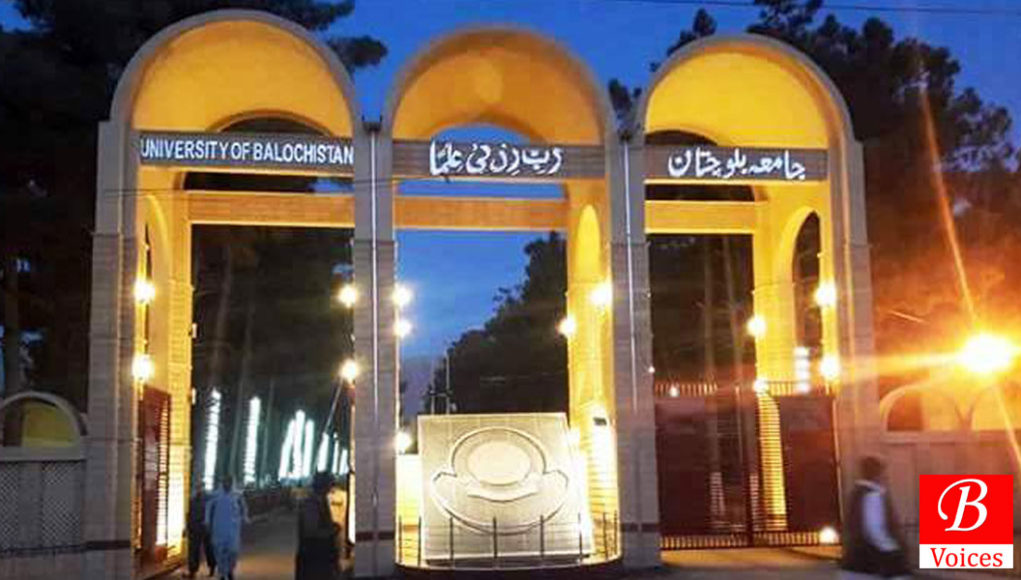Syed Amir Shah
Recently, the provincial cabinet of Balochistan announced the approval of the Balochistan Universities Act 2021, which is aimed to bring a uniform system of governance and administration for all public sector universities inside the province. The government has called the act as a necessary step towards better functioning universities and an effort to effectively manage the higher education sector of the province. This article is aimed to present a critique of the Balochistan Universities Act 2021 (BUA-2021 henceforth), by highlighting its limited scope, failure to understand the very nature and functions of universities and framing higher education merely as an administrative issue.
The central argument of critique of BUA-2021, and its wholesale rejection is premised on the following fact: (i) for the most part, the Act is simply a repackaging of existing university laws, thus, the fossilized colonial model of university administration and governance remains intact, (ii) it reflects that the framers of the Act are completely oblivious and have no sense of the core functions of universities in society and the challenges they are facing in context of Balochistan, and (iii) the only reform that the Act offers is an explicit attack to end the autonomy of higher education institutions (HEIs) in the province. Once implemented, the BUA-2021 will effectively end whatever little autonomy resided in the public sector universities and will make HEIs susceptible to all kinds of political pressures and partisan interests. Thus, the paper argues that the Act is drafted with mala fide intent of bringing universities under the administrative control of the provincial government and making them subsidiaries of provincial bureaucracy.
This paper is organized into three parts. The first part briefly delineates the key roles associated with the functioning of universities in any modern society, and by doing so, it is intended to highlight that what should have been a central focus of policy makers, is in fact completely missing in the reform package. The second part presents an overview of the existing situation and the challenges faced by public sector universities in the province – an area also completely ignored by the Act. Final part will explore the proposed Act in order to lay bare the implicit objective of the draft and to highlight the political and authoritarian imperative of the postcolonial state to control society, institutions and its individual members.
Universities’ role and function in society
Any effort for a meaning higher education reform must begin with a clear and unambiguous understanding of the roles and functions of universities in society, a thorough and dispassionate study of existing situation which is theoretically informed and sensitive to historical and contextual factors, and what role and functions we expect from our universities, which is embodied in a reform agenda.
To begin with, universities are complex institutions and their role and functions are quite varied. They correspond to and interact in a variety of ways with individual, social, political, economic and cultural domains of life. However, there are certain elements that can be associated with the core functioning of universities. These are (i) teaching and research (ii) community and social service (iii) economic development, and (iv) citizenship, democracy and leadership.
At the very core, higher education institutions are places of knowledge creation and dissemination. These two are the most obvious and visible aspects of a university’s mission and purpose. It is important to note that teaching not only entails imparting knowledge, skills and attitude in various academic disciplines to the youth of the nation but also to enable them to critically think and evaluate existing knowledge and the taken for granted assumptions, norms and values in society. The research component is what distinguishes universities from schools, colleges and other types of secular and religious educational institutions in society. Thus, it is fair to say that universities are situated at the frontiers of knowledge production with the dual aim of creating new knowledge and transferring it to the next generation.
Universities are also not hermetically sealed institutions but deeply rooted in the communities in which they are situated. They serve the communities in a variety of ways, including but not limited to the provision and access to reading materials, books and research journals, reading spaces, internet facility, sports facilities and recreation, and also generate economic opportunities and activities around the campus. In fact, many universities have even given birth to cities around the campus. On a broader level than community, universities also serve the society at large by creating useful knowledge, proposing practical solutions to societal problems and introducing innovation to society. One of the most important contributions of universities is extending our understanding and challenging exploitative social structures based on race, gender, class, colonialism, imperialism and other kinds of socially and historically constituted disadvantages.
Universities are also deeply implicated in the economic aspects of life, both at individual level – as reflected in the increased productivity and personal income of individuals, and at national level – as contribution of individuals to the increase in gross domestic products (GDP) of the country. For that reason, universities are often seen as public good, which serves the larger society. It also provides a rationale for public funding of HE. However, the global reform agenda inspired by neoliberal ideology has rebranded the very purpose of higher education as ‘marketplaces’ and framed the students not as students but as customers. The perverted neoliberal logics undermine the idea of publicly supported universities and push for an increase in tuition fee. Unfortunately, these ideas have seeped deeply and have transformed the functioning of our government machinery as well, leading to manifold increase in the tuition fee. Consequently, higher education, both in the country and the province, has become a mechanism of reproducing social inequality, rather than as a ‘great equalizer’.
Universities are also important sites of citizenship making. They play a crucial role in strengthening and promoting democratic norms and values, both at societal level and institutional level. At an institutional level, universities present an inclusive community of students, teachers, administrators and employees from diverse socio-economic, political, cultural, religious, and regional backgrounds. The governing processes of the institutions are based on democratic principles, power is diffused, and decision-making processes include all the major stakeholders including teachers and students. At the societal level, universities serve as nurseries for training future leadership of the nation. Universities are important platforms where young boys and girls acquire leadership skills, participate in political activities, organize various campus events and engage in one of the most crucial aspects of human life – politics.
The social and institutional challenges
From the preceding section, it must be acknowledged that these roles and functions associated with HEIs are ideal types, but at the same time, they can serve an important function of providing us with a sense of direction while talking about or framing any kind of higher education reforms. In this section, I will try to present the current issues and challenges faced by public sector universities in Balochistan that should have been part of higher education reforms but have been completely missed by the BUA-2021. The aim here is not to pinpoint the problems and throw solutions in technocratic fashion, instead, I will try only to highlight the issues which need the attention of policy makers, reformers, administrators, educators and researchers.
From a macro-level perspective through history, the University of Balochistan (UOB) was established in 1973 as an integral part of postcolonial architecture of the state and the province. Despite being conceived as a modernizing agent by its founders, the university functioned primarily as a teaching institution and certificate issuing agency that conferred degrees on those who wish to join government services at various levels. Thus, its basic function was, and still remains to a large extent, the provision of ‘manpower’ to run the provincial administrative machinery and government service sector, for example, JV teachers, SSTs, headmasters, college and university teachers, and mostly lower ranks of bureaucracy in different provincial government departments. This university-society arrangement functioned well in the political economy of the province, as there was no industrialization and service sector jobs available outside the government, and the province remained primarily the producer of raw material.
However, the massification of HEIs, in a vain effort to become a knowledge-based economy during Musharraf regime, led to the increased number of universities in the province. These ideologically driven higher education sector reforms were carried out without taking into account the historical and political economy factors. It was believed that the supply of skilled labor will create its own demand for jobs, thus, trying to put the cart before the horse. The result was not only the waste of huge amounts of resources but also the increase in unemployment, disillusionment, and frustration among the youth, often leading to various kinds of social problems and unrest.
At the institutional level, campuses, both old and new, became more and more closed spaces, with entry strictly regulated and movements closely monitored. The universities increasingly become spaces that routinize security and surveillance practices on the bodies of students and faculty members. The security discourse and the discourse of knowledge economy has framed students and youth as security risks and juxtaposed politics as something antithetical to learning and gaining knowledge. At the same time, the criminalization of politics inside campuses is accompanied by the celebration of culture (mostly dress and traditional dance), thus, what we see is the rise of ‘securitized’ and ‘neoliberalized’ commodified version of culture-minus-politics.
The governance and administrative structure of universities remain highly centralized and bureaucratic, with minimal input from faculty representatives and virtually no representation of student bodies. The governing bodies like syndicate, senate and academic councils are dominated by vice chancellors and his/her handpicked department chairs and deans. With the exception of UOB, universities do not provide for any kind of representative and elected bodies for faculty members, making teachers vulnerable to any kind of pressure and exploitation. However, the campuses are most hostile to the primary stakeholders of the higher education sector – the students. Students are the most marginalized and exploited group, having no say in any matter of the university. To put it in perspective, in the last two decades, students have been burdened with more than an astounding 600% increase in tuition, having no right to unionize, daily humiliation at university entrance, continued surveillance, and all these without an iota increase in the quality of education they are receiving.
The research infrastructure and teaching capabilities of universities in Balochistan are quite dismal and require thorough investigation. This, of course, cannot be done here. One way to investigate the status of research is by looking at the research methodology curricula and textbooks recommended at various departments and programs in our public sector institutions. The study of research syllabi of various social science departments at UOB reveals that even a Ph.D. courses do not teach data analysis, either quantitative or qualitative, as part of syllabi. Also, none of the departments has subscription or any kind of access to the research journals of their respective fields. Regarding teaching practices, the issue that needs to be explored is the role of teachers (i) as a facilitator and a guide who makes sure that the students are introduced to the topics from various theoretical perspectives and ensure that students read all the relevant literature of the field (ii) or as an all knowing person whose job is to maintain discipline inside the class and to “pour knowledge into the empty vessels of students”, to rephrase Paulo Freire.
The Balochistan Universities Act 2021
Having looked at the role and function of universities in a society and briefly highlighting some of the issues and challenges in the context of Balochistan, it is fair to ask our policy makers a few simple questions – what is the Balochistan Universities Act 2021 aimed at and what is it trying to achieve through this Act? What pilot study/studies were taken before initiating reforms, if any? Who are the main actors involved in the reform process? Was the process transparent and inclusive of all stakeholders of the higher education sector? These are few of the important questions which need to be addressed, however, the succeeding section deals only with the first question i.e. what aspect of the higher education sector is targeted by the reform Act.
At this point, I want to bring one very important element which is central to all higher education institutions. Given the nature and purpose of universities as a change maker, interests of HIEs are oftentimes diametrically opposed to that of entrenched social groups who benefit from the status quo. It is, therefore, crucial to maintain a level of autonomy and insularity of HEIs from the power of dominant groups. Without this protection and guarantee of autonomy, universities are not only severely handicapped to perform their core functions and duties but are also transformed into an ideological apparatus of the dominant political groups in society. In other words, universities without autonomy are anti-society rather than pro-society institutions.
As delineated earlier the role of HIEs in teaching and research, service to community and society and its function in building democratic and socially just society, the Act is characterized with a meticulous silence on all important aspects associated with the functioning of the higher education sector. For most part, the BUA-2021 is the re-enactment of previous laws, albeit, with one important change. It reproduces the colonial era authoritarian structure of universities with all powers concentrated at the top, but at the same time, it tries to achieve the aim of bringing this totalitarian model under the control of provincial administration. The primary objective of the Act is to add another layer of hierarchy at the top without actually dismantling the whole authoritarian structure.
As have already mentioned the central role of autonomy in the functioning of universities, the BUA-2021 does exactly the opposite – the entire Act is designed to achieve this single objective of undermining and subverting the institutional autonomy of all public sector universities in the province. It is an explicit effort to transform the higher education sector to serve the narrow agenda of ruling elites, instead of serving society at large. It blatantly undermines the role of universities in citizenship making, promotion of democratic norms and values, and as a platform which provides a nation with genuine political leadership.
What is proposed here is that any meaningful reforms should not begin with an understating of higher education as an administrative issue, but rather, education should be front and center of the reforms. The reforms should reflect the fact that universities are public institutions and run through public exchequer, thus, they should serve the public interest, particularly those at the margins of society. The reforms should preserve and promote the transformational and developmental character of universities, and not be transformed into retrogressive institutions aimed at reproducing social inequalities. It is also expected that any reform agenda must be informed by thorough analysis and comprehensive understanding of existing challenges and issues in the higher education sector.
But sadly, there is no effort from the policy makers to understand the potential of higher education in the development of society and state. The BUA-2021 has miserably failed even to discuss the core issues in the field of higher education. The reform effort seems to be an ideological act which is not aimed at the improvement of the higher education sector to maximize its potential benefits to the society but to effectively control and govern the institutions to serve a narrow political agenda.
Conclusion
To wrap-up the whole debate, it is important to remind us that education is and never was a neutral enterprise but a deeply political project at its heart. It involves important political decisions, including but not limited to: who controls and governs the knowledge production? What is allowed to be taught and what is prohibited? Whose languages are to be privileged and whose to be marginalized? It also involves decisions about which cultural, religious, and historical aspects to be remembered and used for production of national identity and the aspects which are silenced and erased from the national consciousness. It is also about the kind of citizen which is desired by the state, either as a free and autonomous member of society with all fundamental rights or as a subject fit for authoritarian rule? These are important political questions which determine the kind of education we are receiving as a member of society.
Applying this lens to understand the BUA-2021 reveals that there is not even a slightest effort from policy makers even to understand the higher education sector of Balochistan, let alone desire any meaningful change. Thus, it is our added responsibility, as teachers, researchers, and conscientious members of society to save the higher education of Balochistan from extinction. This can only be achieved through collective action and organized resistance against the BUA-2021.
The writer teaches Political Science at the University of Balochistan and can be reached at [email protected].
Disclaimer: Views expressed in this article are those of the author and Balochistan Voices not necessarily agrees with them.








